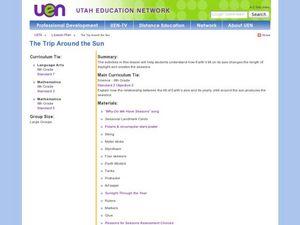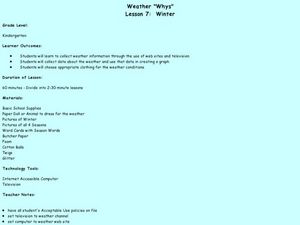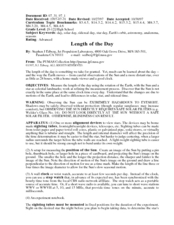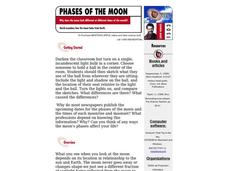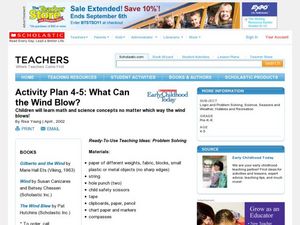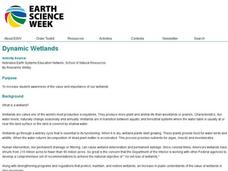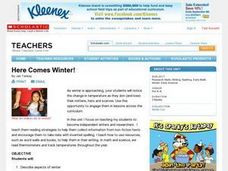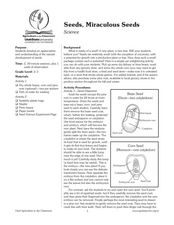Curated OER
Follow Spring's Journey North Recording Highlights of the Season
Students scan headlines on the Journey North News Updates each day to track the changes that spring brings as it comes to different areas of the United States.
Curated OER
The Trip Around the Sun
Sixth graders investigate the relationship between the tilt of the Earth's axis and the seasons. In this earth science lesson, 6th graders sing the song "Why Do We Have Seasons" and use simulate the Earth's tilt by using their bodies.
Curated OER
Scientist Tracking Network
Students correlate surface radiation with mean surface temperature of several geographic regions. They observe how these parameters change with latitude and construct an understanding of the relationship of solar radiation to seasonal...
Curated OER
The Sun Affects Earth
Third graders read, write, and listen to information about the sun and its effects on the Earth.as it relates to its axis, orbit, rotate, and revolution. In this solar system lesson, 3rd graders examine how the sun effects the Earth's...
Curated OER
Playground Greenup
Young scholars document changes in the playground vegetation during the year by making drawings or taking digital photographs of grass, trees, bushes, weeds, and other vegetation. They study how the color of vegetation changes during...
Curated OER
What is Weather?
Students identify different types of weather and explore the weather for each season of the year. They complete a class seasonal weather chart, listen to the book "Oh Say Can You Say What's the Weather Today?," and create a magazine...
Curated OER
Birds on the Move
Students observe the migrational path of the Swainson's Hawk from northern Minnesota to the southern portion of South America. They study the migratory path of the hawk and observe how the vegetation in a particular region of the earth...
Curated OER
Autumn
Take a walk through the forest as the leaves change color and fall from the trees, making way for a new ecosystem cycle to cycle through. An inquiry-based lesson plan examines how the process of decomposition eliminates tons of biomass...
Curated OER
Penguins Nesting Know-How
Students maintain a field journal as they follow penguin parents raising their chicks during the breeding season. They formulate testable questions. Students reflect on animal behavior in the field related to survival and chick rearing.
Curated OER
Falling Into Leaves
Students investigate why leaves change color. In this chlorophyll lesson, students examine how chlorophyll effects the color changes in leaves. Students take pictures of changing leaves, and create a class quilt showing the changes of...
Curated OER
Follow the Sun
Students use a simple model of the Earth and Sun as seen from space to explore the sun's apparent movement across the sky over the course of a day and year. They consider the apparent direction of movement and changes in the sun's angle.
Curated OER
Weather Whys
Second graders experiment with a thermometer and water samples of varying temperatures. They examine the effect different colors and different fabrics have on retaining heat. They examine snow samples for water and dirt content. They...
Curated OER
Length of the Day
Students investigate how the Earth's rotation affect the length of day. In this earth science lesson, students construct a sighting apparatus and record their observations over a few days. They analyze data collected and formulate a...
Curated OER
My Tree Book
Students "adopt" a tree and throughout the year record and examine its characteristics and the changes that it goes through.
Curated OER
Look At Those Leaves!
Young scholars collect, observe, sort, and measure leaves. In this leaf lesson plan, students take a walk to collect leaves. They bring the leaves back into the classroom to observe, sort, and measure them. They visit a website to learn...
Curated OER
Phases of the Moon
Young scholars explore why when you examine the moon depends on its location in relationship to the sun and Earth. The moon never goes away or changes shape-we just see a different fraction of sunlight being reflected from the moon to...
Curated OER
Migrate, Adapt, or Hibernate
For this migration and hibernation worksheet, students read a 2 page informational excerpt about animals who adapt to changing seasons by migrating or hibernating. They then use the information they learned to answer the 15 questions on...
Curated OER
What Can the Wind Blow?
Students observe math and science concepts no matter which way the wind blows. In this early childhood problem solving lesson, students will develop science, math, and observation skills as they learn about the wind.
Curated OER
Tree-Ring Dating
In this tree-ring dating worksheet, students use activity sheets to determine a tree's age and to observe changes in climate from the tree-rings. Students investigate how archaeologists use tree rings to date evidence and they answer 5...
Curated OER
Planting Pumpkins
Students plant pumpkins. In this agriculture lesson, students use pumpkin seeds, mulch, and shovels to plant seeds from a pumpkin. Students observe the changes during each season.
Curated OER
Dynamic Wetlands
Students construct and observe a model of two different types of wetlands. In this wetlands lesson, students create a model of a wetland with constant drainage and a wetland that maintains a well-saturated soil. Students observe and...
Curated OER
Autumn Crossword Puzzle
In this online/interactive crossword worksheet, students read clues and solve the puzzle using words about the autumn season. Students type 21 word answers and check them by observing the color of their answers-yellow indicates a correct...
Curated OER
Here Comes Winter!
Students investigate winter behaviors in animals. They describe winter and write about the characteristics of the season by drawing and labeling a winter picture. Students then conduct research on a chosen animal and create a chart. ...
Curated OER
Seeds, Miraculous Seed
Students investigate relationships between plants and animals and how living things change during their lives. In this life cycle lesson, students split different types of seeds apart to see the beginning life stages of future plants.



